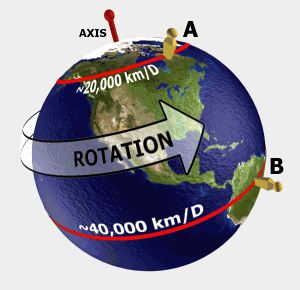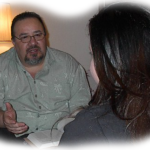During a recent conversation with a fellow Christian who was arguing that he wanted to start digging deeper into the things of God, I challenged him with what seemed a simple question.
I asked him, “Do you believe that the earth is spinning at 1,000 miles per hour?”
He paused a moment and answered, “Everyone knows the earth spins.”
“How do you know that for certain?” I asked.
“Because that is what we have been taught all of our lives,” he said with much confidence, then he hesitated, “Right?”
I asked him another question, “Do you believe that the earth is round?”
With a frown of suspicion on his face, he responded, “Of course!”
“How do you know that for certain?” I asked.
“Because …” he said slower this time, “that is what we have been taught all of our lives. What are you getting at?”
I smiled, “Well, in Genesis, the Bible teaches that God created the earth and that it was just formless water. Then, God opened a space inside that water, like a giant air bubble, and caused dry land to appear. After that, it says, He put into that same space, in the water, the stars, the sun, and the moon. Do you believe that?” I asked him.
He stared at me for a moment, as though he was trying to see through a dirty window.
Then, as though he had caught onto something, he asked, “That’s a trick question, right?”
“No,” I smiled again, “That is the truth.”
“So you’re saying we live in a giant air bubble inside a lot of water?” he asked incredulously.
“Whoa!” I replied smiling even more, “I didn’t write the Bible, nor did I inspire it. Read it for yourself. Genesis 1:1-17”
He snatched open his Bible and started reading out loud. I waited until he finished and asked him, “Do you believe what the Bible teaches about the creation of the earth?”
This time, though, he just stared at me, then down to the Bible he was holding, and back up to me. He opened his mouth to say something, then looked back down at the Bible, then back up to me.
“This is very different from what we have been told, right?” he said.
There are many godly believers who want to “dig deeper” into the Bible, as my friend said, but the first thing they have to confront is the question whether they are prepared to believe what they read and whether they are ready to change their minds about what is true.” Too many believers want to learn more about Bible teaching but will struggle greatly when they are confronted with something that differs from their existing beliefs.
 From the first day you entered a school class, you were faced with a globe of the earth. The concept of a round earth was immediately implanted in your mind, and then it has been reinforced continuously since then. We hear about space, and trips to the moon, and possibly other planets. We are told the earth spins around at 1,000 miles per hour, and 67,000 miles per hour around the sun, and over hundreds of thousands of miles per hour through the Milky Way Galaxy. We are told that nothing existed, but that the nothing exploded and, due to that, we now have a universe. I could keep on going with all that we have been taught, and we have accepted all of that with little to no real proof. If the scientists say it is true, we accepted it as truth. You can go outside this very moment, look up into the sky, and if you pay attention to your natural senses alone, you will notice nothing that proves the earth is spinning. Yet, regardless of what your senses tell you, your mind will argue that the earth is spinning. Why? Because that is what you already believe.
From the first day you entered a school class, you were faced with a globe of the earth. The concept of a round earth was immediately implanted in your mind, and then it has been reinforced continuously since then. We hear about space, and trips to the moon, and possibly other planets. We are told the earth spins around at 1,000 miles per hour, and 67,000 miles per hour around the sun, and over hundreds of thousands of miles per hour through the Milky Way Galaxy. We are told that nothing existed, but that the nothing exploded and, due to that, we now have a universe. I could keep on going with all that we have been taught, and we have accepted all of that with little to no real proof. If the scientists say it is true, we accepted it as truth. You can go outside this very moment, look up into the sky, and if you pay attention to your natural senses alone, you will notice nothing that proves the earth is spinning. Yet, regardless of what your senses tell you, your mind will argue that the earth is spinning. Why? Because that is what you already believe.
On the other hand, people who claim the name of Jesus, will read the Scriptures and love them and want to hear about them. But, when they run across a teaching which challenges what they already believe is true, they will depend on their senses. My friend, after reading the Genesis passage, looked up into the sky. He looked up and then spanned across the whole sky.
“I don’t see any water up there,” he said as if that alone was the entire proof that it did not exist.
“Can you feel the earth spinning,” I asked him.
“No.”
“So, you believe that the earth is spinning, even though your senses have no proof, but you cannot believe the Genesis teaching because your senses tell you there’s no proof, right?”
My friend is typical when it comes to those of us who claim to believe in a God. When people hear what they already believe, proof or not, they will accept it without question or challenge. Evidence is not required or expected. But, when the Bible teaches something that is challenging, people will immediately consider their senses, life experiences, and what they already believe as the test before they will accept the Word of God. The teaching in Genesis is a perfect example of this conundrum in which many believers find themselves often. They believe scientists much more readily than God Himself.
God, in and of Himself, is a real challenge for us as humans. Just the idea that some being exists which is capable of impossible things, is all-powerful, knows everything that has, is, or will happen, and can be in one or more places at the same time, is intimidating. Next to a being like this, we are seemingly nothing but tiny specks. No wonder the atheists don’t want to believe in a God, it diminishes them. Any person who can consider the existence of such a being without unnerving awe is crazy. Yet, “believers” throw the name of Jesus around as though it was something easy to grasp.
Think about what we claim to believe. First, that there is actually an alien being that is that powerful, and that the most solid “evidence” we have of His existence is the Bible. I put quotes around the word “evidence” because I am using the word loosely. Using evidence to prove anything requires that you first decide what you will accept as evidence. One group of people may accept somethings as evidence, while others may reject the same. In any case, we all know the Bible was written by men, who the Bible itself claims were inspired by the Holy Spirit. In other words, the Bible claims that it is its own evidence. Other than the Scriptures’ own claim of evidence, there is no other evidence that the Bible is the actual “Word” of God. We either will accept this or not. This is a simple decision of the mind.
I don’t know about you, but I do not accept anything as truth until I am able to put it to test. I have had to do this with everything I have believed my entire life. I have believed things, in the past, which turned out to be lies or error. Those times resulted in bad decisions, problems I did not need to go through, and loss of relationships or benefits. Just because I believed that something was true, did not prove it was. The results eventually taught me the truth. So, I changed in how I accept the truth. I challenge everything, and what is true will prove itself through acceptable evidence. When I deal with the Bible, the Word of God, I do the same. I do not believe anything until I find enough evidence to support what the Scriptures claim. One caveat, though, I have no problem allowing the Bible to be its own evidence. On the other hand, I will challenge the Scriptures. I know there is nothing wrong with this because the Scriptures themselves teach that God is just fine with being tested. In the third chapter of Malachi, in the 10th verse, the Word claims that God issued a challenge to believers. It quotes the Lord as saying, “Test Me.” I, for one, will not argue with God. If He says, “Test Me,” I will test Him. This is not some attitude problem on my part, it is obedience. My senses tell me that I should just “humble” myself before the Lord, and grovel at His feet, just because He is God, I mean, who the heck do I think I am? On the other hand, am I going to disobey God because my senses tell me different? Notice in the book of First John (4:1 NASB), “Beloved, do not believe every spirit, but test the spirits to see whether they are from God, because many false prophets have gone out into the world.” If I just accept everything I read, or am taught as being, in the Bible as the truth, I might deceive myself. God is warning me to pay attention. He does not want me to fall for lies, and start believing heresy (stuff that sound like the truth, but is not). So, He instructs me to “test” and see if it is from Him or not.
You probably remember the Biblical story of Jesus’s forty day fast (not eating for that time period). Satan appeared to Him and tried to tempt Him. At one point, the enemy even quoted Scripture to the Lord. Do you understand? The devil himself read from the Bible, word for word, and he was still lying. Just because the Bible says something, it is not enough to prove it is from God. The Bible truthfully quotes Satan as saying something, but it also teaches that everything Satan says it a lie. Satan is quoted in the Bible, right? But, we should never take what he says as truth, just because it is quoted in the Scriptures. That is why God instructs us to test the spirits to see if they are from Him. Along with this, we have the problem of hundreds of version of the modern day Bible. Each was translated according to the understanding of the translators. One person may understand the meaning one way, while another person will understand it differently. On top of that, we have the problem of word usage. Modern words are affected by culture, tradition, region of the country, slang, work related terminology, and so on. In the days when the Bible was written, they had the same circumstances. This means that without careful study and research, one may end up with false interpretations. It almost sounds as though we may not be able to get the correct meanings and therefore the actual truth to which God wants us to come to an understanding.
How can we really know the truth? The Bible gives us that answer as well. In 2nd Timothy 2:15 (NASB), the Word says, “Be diligent to present yourself approved to God as a workman who does not need to be ashamed, accurately handling the word of truth.” Notice the phrase at the end, “Accurately handling the word of truth.” There is a right and wrong way to “handle” the Word of God. God’s own challenge to His children is the right way, “Test Me.” To do this we have to, first
When I use the word principle, I am using this definition, “a fundamental truth or proposition that serves as the foundation for a system of belief or behavior or for a chain of reasoning.” This means that the principle will become my foundation in determining how I will or will not act or respond in certain situations or circumstances. For example, in Proverbs 3:7 it says, “For as he thinks within himself, so he is…” The principle is, “People do what they do because they believe what they believe.” Now, with this principle I can make certain and specific decisions, and come to certain and specific conclusions. I can know that humans will always behave in some specific manner, or make similar choices, because of what they believe. So, if a person believes he is superman, he will then start dressing up in a costume with a big “S” in front of it and try to fly. Sure, they are probably crazy, but they believe what they believe, so they do what they do. In regards to believers in God, those who believe that God blesses those who tithe and give offering will then pay tithe and give an offering. If a person believes that God can be trusted, he or she will then live calmer lives, because they believe God will help them through those tough times.of all, identify what we will accept as evidence. My opinion is that we must accept the Bible itself as our foremost evidence. To accomplish this, we must study and research the various Bible versions, and make a decision which we believe is best for our use. Then, we must find, within those pages, the evidence it espouses, then study and research it. My method is to find the principles it teaches, and then put them into action, and see the results. My personal argument is that the results will tell you if what you believe about God and His Word is true or not.
Now, if the principle I mentioned above is correct, anyone can use it to make certain and specific decisions and choices in their lives. If the principle is applied correctly, it will have the expected results. This, in and of itself, will become part of the evidence which in the end will either sustain the belief that God is real or not. The beauty of using Biblical principles as evidence is that they are not dependent on our feelings or senses. They either work or they do not.
My friend decided to do some research on the question of how God created the earth and heaven. He is still researching, but he does admit one thing. If he reaches the conclusion that the Bible is correct about how God created the heaven and the earth, he had some rather big changes to make in his idea of reality. But what about you dear reader, how do you know what the truth is?








